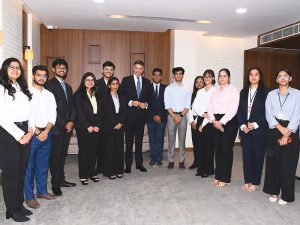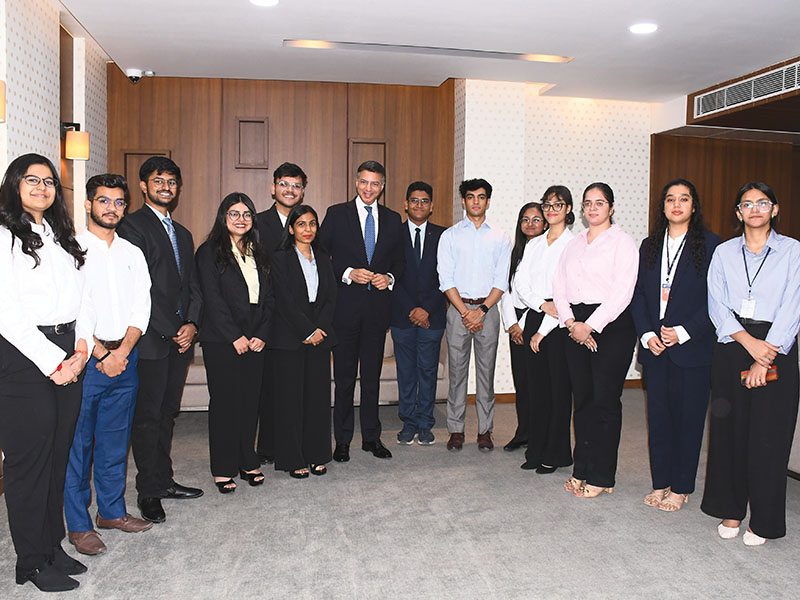21 Higher education leaders racing to develop india’s high-potential human resource: Atul Chauhan
Atul Chauhan
Chancellor, Amity University

An alumnus of University College London and the London School of Economics, Atul Chauhan is Chancellor of Amity University (AU) and Chief Executive of the Amity Group (estb.1994) which comprises 11 universities, 26 K-12 schools and 30 other education institutions in India and abroad.
What are the major objectives set for Amity University until India’s 100th Freedom Anniversary in 2047?
Thirty years ago, when the not-for-profit Amity Foundation was in its infancy and our Founder Ashok K. Chauhan had returned to India after 35 years in Germany, he had proclaimed an intention to establish education institutions to transform India into a global superpower.
Some of the major objectives we have set are to develop Amity University into the largest private contributor to India’s research and innovation ecosystem; plant the Indian flag in over 50 education campuses worldwide, and transform Amity into a leader in industry-academia partnership.
How satisfied are you with your progress thus far?
For anyone in the field of education, nothing is more satisfying than the success of their alumni. As I look upon the 250,000 students currently enrolled with us and the over 700,000 alumni we have worldwide, I can see the dream of Chauhan coming to fruition.
With schools and universities in 12 states of India and 15 countries worldwide, we are proud that the quality of education delivered by Amity Group — an Indian institution — is acknowledged as world-class. When Uzbekistan wanted a world-class university they chose Amity. When Amsterdam wanted a world-class K-12 school, Amity established a school in their most iconic heritage buildings.
When Harrow School, UK, one of the world’s most elite schools, needed a partner to expand globally, Amity was their choice with Harrow School, Bangalore established in 2023. This year Amity will inaugurate the Harrow School, USA on our 170-acre campus on Long Island, New York — the first campus of any British school in the US.
With campuses in London, Singapore, Dubai and other countries around the world, Amity has achieved what no other Indian education group has thus far.
How satisfied are you with Amity University’s connect with Indian industry?
Right from the start, Amity’s focus has been on establishing strong and deep partnerships with industry. Many years ago, we initiated a successful experiment to build industry-led institutions. Therefore our industry partners play a critical role in shaping the curriculum, contributing faculty, offering hands-on experience including internships to our students, and facilitating placements. Notable examples include the Amity Institute of Technology in partnership with Tata Technologies and the Amity-CII School of Logistics.
R&D and innovation are widely perceived as Indian academia’s infirmity. What’s your institutional response to create new knowledge?
Before we established the first Amity University, we travelled the world to benchmark with the best. At that time, it became clear that research and innovation in Indian academia was inadequate. Therefore, right from the start we have described AU as “a research and innovation-driven university”.
But the journey is long and it’s hard to keep up with the world’s best universities whose annual research budgets are in excess of a billion dollars because they receive funding support from government and industry. Nevertheless, we are determined to bring great scientific minds together in AU and provide them with the resources and environment to conduct path-breaking, high-quality research. Recently, the Union ministry of commerce conferred the National Award for Intellectual Property and Innovation on AU.
What’s your prescription for transforming India into a $30 trillion GDP economy by 2047?
To transform India into a $30 trillion GDP economy by 2047, education must be the cornerstone of economic development. I envision a new India driven by a bright, confident, skilled, innovative, and inclusive workforce. Equitable access to quality education — especially in rural and underserved areas, will unlock huge demographic potential.
Public-private partnerships must scale vocational training and lifelong learning to prepare our youth to compete in global markets while research and innovation must be driven by liberal funding, global collaboration, and academia-industry synergy. Simultaneously, empowering teachers with technology and continuous professional development is essential. Education reform should become a national priority to unleash India’s potential.
Also Read: Amity founder receives Agriculture Leadership Award 2025

















Add comment